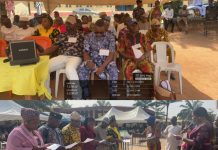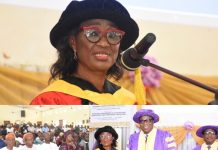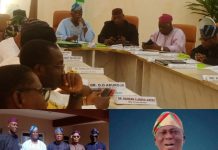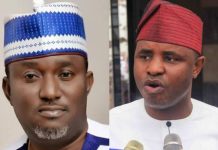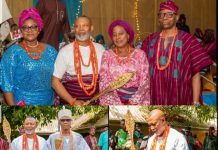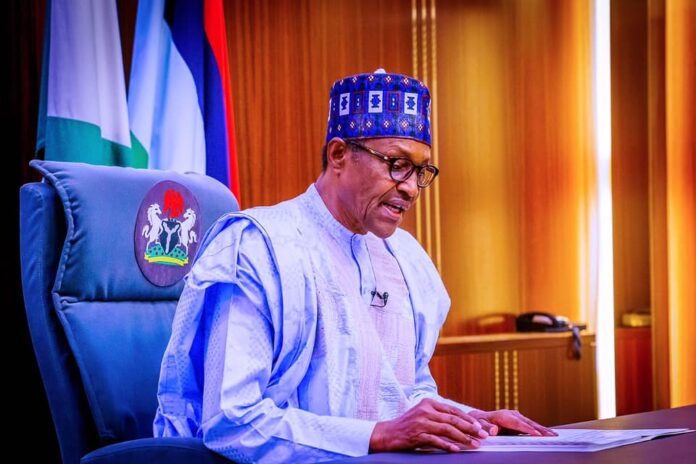

A Civil Society Group has advocated fashioning out of a comprehensive National Homeland Security Strategy to prevent counter productivity of security outfits created by States and Local Governments.
The National Coordinator of Network for Democracy and Development, NDD, Mr. Tajudeen Alabede who made the call in a maiden Virtual Press Conference of the group on the state of the nation said the pragmatic National Homeland Security Strategy would ensure devolution of more responsibilities to States, strengthening of community policing and help achieve greater national security in a well-regulated
environment.
“NDD notes that the increased cases of criminal activities across the country have led to a proliferation of security outfits. Many State Governments and local
communities have set up security outfits to complement the effort of federal agencies. While the precarious situation demands that all hands must be on deck,
the proliferation, without adequate coordination, could be counter-productive in the long run”.
“Government should also invest more in intelligence gathering, motivation and
proper welfare for security personnel and ensure that the equipment needed to
properly combat the nation’s multi-faceted security challenges are provided”.
Mr Alabede lauded the coordinated efforts of the federal and affected States that led to the release of the abducted students of
Government Science Secondary School, Kankara, Katsina State and pleaded that such feat should be recorded to secure the release of Leah Sharibu, the only remaining girl from among the abducted students of Dapchi, and the remaining Chibok girls who are still held captive by Boko Haram.
“One of the recent positive developments in the area of security was the coordinated efforts between the Governments of the affected States and federal security and agencies that led to the release of the abducted students of Government Science Secondary School, Kankara, Katsina State. NDD, while commending the Government for this feat, appeals for greater coordination among the agencies of Government to ensure improved security for the citizens”.
“In the same vein, we implore the Government not to relent in its efforts to secure the release of Leah Sharibu, the only remaining girl from among the abducted students of Dapchi, and the remaining Chibok girls who are still held captive by Boko Haram”.
The group decried the plans by educational institutions across the country to
resume academic activities without adequate safety measures to contain the devastating impacts of the second wave of COVID-19.
“The consequences of poorly regulated resumption plans amidst the rising cases of COVID-19 may be catastrophic”.
“Nigeria has witnessed a devastating impact of the second wave of COVID-19,
including the death of some high-profile citizens in the past few weeks. NDD is,
therefore, alarmed by the plans by educational institutions across the country to resume academic activities without adequate safety measures”.
“It is discomforting that many Governments have not gone beyond merely issuing statements encouraging schools to observe COVID-19 protocols. In this situation, the hapless students, pupils and staff are literally left to their fate as adequate safety measures are not put in place by the Federal and State Governments.
NDD considers this inappropriate as the primary duty of any Government is the security and wellbeing of the citizens”.
“It is an irony that, while the plan for schools to resume is moving at a high speed,
the same Governments are vigorously campaigning against large gatherings. That this is taking place against the background of insecurity across the country makes it all the more indefensible. What NDD expects is for the Government at all levels to regard COVID-19 as a national emergency which would demand that affected sectors are provided with all the necessary support that they need to cope with the impact of the pandemic”.
“In the minimum, Government should consider providing facilities for virtual classes, deploying health and security personnel to schools to handle emergencies,
providing hand sanitisers and masks to students and staff, providing testing
facilities for compulsory testing of all students and staff and setting up isolation
centres in all Local Governments. Besides, there should have been a well-coordinated plan by the Federal and State Governments about phased resumption in a way that would prevent overcrowding in the institutions. We commend University of Ilorin and a few other institutions
that have properly articulated their phased resumption plans”.
“The education sector embraces the largest percentage of citizens – from kindergarten to postgraduate classes. It is a sector that is most affected by COVID-19 pandemic”.
He noted that for almost a year that the country has been battling with COVID-19, the nation is yet to take advantage of the
pandemic and its attendant negative effects to radically overhaul the affected
sectors, especially, education, health and agriculture, with a view to bringing them
in compliance with the new realities.
“Almost one year after the index case of COVID-19 was recorded in Nigeria, we
seem not to have learnt many lessons. The nation is yet to take advantage of the pandemic and its attendant negative effects to radically overhaul the affected
sectors, especially, education, health and agriculture, with a view to bringing them in compliance with the “new normal”.
“COVID-19 should provide an impetus for an upgrade of the nation’s health facilities. Greater attention needs to be given to primary healthcare. The effort to
strengthen the health system should include a massive investment in Primary Health Centres across the country. If a major percentage of annual budgetary allocation to health could be spent in this area, this will reduce the burden on the
tertiary health institutions which are to focus and deliver on specialist services”.
“In addition to this, public awareness on public health should increase, National
Health Insurance Scheme (NHIS) should be reorganized to meet up with global best practices and changing trends of health care needs and there should be more investment in research and development, alternative medicine and the training and remuneration of medical personnel to discourage brain drain. Nigeria should
strive to come out of the pandemic stronger”.
On the state of the economy, NDD recommended that the renewal of licences of DISCOs and GENCOs should be based on performance while the government should look inward to generate power from other renewable energies that are cheaper and more readily available.
“On power, we observe that the current arrangement with the DISCOs and GENCOs is not working to the advantage of the people. It is our recommendation,
therefore, that upon expiration of their licences, renewal should not be
guaranteed except for those who have met their obligations under the current contract.
We are recommending that the Federal and State Governments should work
together to develop a more pragmatic power framework that will make life more
comfortable for citizens and their businesses. With advances in power technology, there are already cheaper and more readily available alternative sources of power”.
“Emphasis should now be on renewable energy which is readily available in
different parts of the country: water (for hydropower), sun (for solar energy), wind (for wind turbines) and organic wastes (for biogas).
In the short-term, renewable power generation clusters can be established for
industrial hubs and small scale industries at subsidised rates. Local Governments or
clusters of Local Governments can also be encouraged to work with the private sector to explore the conversion of wastes to biogas for the purposes of power generation and domestic gas usage”.
The group also frowned at multiple taxation which continued to affect small scale businesses and called for more holistic way of harmonizing taxation in the country.
“Government at all levels needs to take a more passionate look at the issue of multiple taxations which is a major disincentive for small businesses. Tax issues should be harmonised and made simple to encourage prompt payment and widening of the tax net”.
NDD applauded the social investment programmes of the Federal Government but called for greater transparency as Nigerians who were covered by the programme should have been issued with a
national social security number.
“Except for the recent COVID-19 interventions
targeted at MSMEs, the amount of money given to the vulnerable women and
traders is grossly inadequate to empower them on a sustainable basis. It is also not enough to give stipends to vulnerable people for feeding. A means can be designed to help them to make some savings and little investment against the future. This will have a multiplier effect on the economy and also empower them on a sustainable basis”.
Mr Alabede said the on-going process of verification of citizens’ National Identification Numbers should be used by the Federal Government to move Nigeria towards the emergence of a unified National Identity system. “The multiplicity of the officially recognised identification systems needs to be reviewed and streamlined. The burden that this imposes on Nigerians is unimaginable”.
He emphasized the need for effective fight against corruption while the deliverables of each of the Ministers and heads of agencies should be available to the public.
“There is the need for an improved strategy for a more efficient running of the government and a more effective fight against corruption. These twin challenges are inter-related as a clumsy governance system is an enabler for corruption. The strategy for the anti-corruption campaign needs to be reviewed and strengthened. Relevant laws need to be reviewed, intensive public education and
enlightenment as well as promotion of exemplary, honest leadership need to be pursued more fervently, flamboyant lifestyle by public officials should face public opprobrium and corrupt officials should face quick justice under the law”.
“Besides, the deliverables of each of the Ministers and heads of agencies should be available to the public. This gives each of them a SMART target known to all”.
NDD noted that one of the ways by which Nigeria could have truly independent and viable political parties is through compulsory financial contribution by party members and hammered on the need for a more transparent and credible leadership selection process that is not susceptible to brazen manipulation and hijack by money bags in political parties.
“We have an unusual situation whereby a number of the existing political
parties operate like businesses either as sole proprietorship or limited liability companies with several owners. Every political party should be jointly owned by all of its registered members”.
Mr Alabede also called for categorization of political parties in the country to national, local or issue-focused.
“Worried by the proliferation of political parties that participate in national
elections, as witnessed during the 2019 general elections, NDD supports the deregistering or delisting of the poorly performing parties. However, we believe that this measure may not be helpful in the long run”.
“NDD recommends that INEC and the National Assembly should consider
categorization of parties. Thus, while some political parties may operate as
national parties, others may choose to operate as local or issue-focused parties.
There should be certain conditions that should be met before a party can be
registered to participate in certain elections. This way, a party that may not have
the resources to participate in a national election may do well in local elections. In
the same vein, a party that is interested in promoting a narrow yet legitimate
agenda would have the opportunity to make an impact. This will also encourage more Nigerians to participate in the political process and engender cooperative attitude among parties as broad-based coalitions of like-minded parties may flourish. What’s more, the financial burden on parties to prosecute major elections will be reduced”.
The group called for review of the provision in the constitution which placed School Certificate as the educational qualification for election into political offices stressing that the minimum should be first degree or its equivalent.
“We also observe with dismay, the provisions of the Constitution which puts School Certificate as the educational qualification for election into political offices in the country (Sections 131(d), 176(d), 65 (2(a)), 106(c)). In view of the growing complexities in managing the affairs of any nation in this tech-driven era of globalisation, we consider School Certificate grossly inadequate for anybody to effectively run the offices of the President, Vice President, Governor, Deputy Governor, Member of the National Assembly, Member of the State House of Assembly and Local Government Chairman.
NDD, therefore, proposes that the minimum educational qualification for election for these positions should be first degree or its equivalent. Thus, Sections 131(d), 176(d), 65 (2(a)), 106(c) of the Constitution need to be amended accordingly”.
The group worried that many Nigerians still cared more about having their own people in positions of authority than having the right people who could deliver on the mandate of such offices while religion and ethnicity still defined the country’s politics.
“The high degree of mutual mistrust among Nigerians and the attendant tension
that this generates should be a matter of concern to us all. Cries of marginalization
– real and imagined – are rife across the country.
It is sad that Nigerians carry on as if the two main religions – Islam and Christianity – as well as the ethnic groups, especially the major ones, are political parties which are in contest for power. To a large extent, these issues, rather than good governance and sustainable development, still define our politics”.
“In 2020, three issues generated avoidable religious controversy on the national stage, namely: the new Companies and Allied Matters Act (CAMA) 2020, the death of Alhaja Asiyat Oyedepo and Bishop Mathew Hassan Kukah’s Christmas homily. While we have seen a rise in ethnic agitation across the country, the protests by youths against police brutality last October brought to the fore the nation’s fragile fabrics”.
“NDD is worried that much of the Government’s efforts at national peace and
stability are ad-hoc and reactionary. We, therefore, call on the Federal Government, especially the National Assembly, to review the inter-ethnic and inter-religious situation in the country and come up with laws that would guarantee Freedom of Religion or Belief (FoRB) and rights of citizens in a plural society as ours towards the attainment of greater national peace and stability. While there should be equal opportunity for all citizens, the policy on federal character should be reviewed to recognize the comparative advantage of states and regions.



